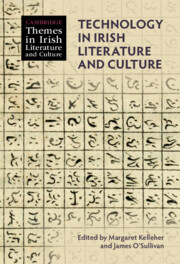Book contents
- Technology in Irish Literature and Culture
- Cambridge Themes in Irish Literature and Culture
- Technology in Irish Literature and Culture
- Copyright page
- Epigraph
- Contents
- Contributors
- Cambridge Themes in Irish Literature and Culture
- Acknowledgements
- Introduction
- Part I Genealogies
- Part II Infrastructures
- Part III Invention
- Part IV The Digital
- Chapter 14 Irish Literary Feminism and Its Digital Archive(s)
- Chapter 15 Consoling Machines in Contemporary Irish Fiction
- Chapter 16 ‘At Me Too Someone Is Looking’: Staging Surveillance in Irish Theatre
- Chapter 17 Technology in Contemporary Irish Poetry: Data at ‘the Edge of Language’
- Chapter 18 Irish Digital Literature
- Index
- References
Chapter 18 - Irish Digital Literature
from Part IV - The Digital
Published online by Cambridge University Press: 19 January 2023
- Technology in Irish Literature and Culture
- Cambridge Themes in Irish Literature and Culture
- Technology in Irish Literature and Culture
- Copyright page
- Epigraph
- Contents
- Contributors
- Cambridge Themes in Irish Literature and Culture
- Acknowledgements
- Introduction
- Part I Genealogies
- Part II Infrastructures
- Part III Invention
- Part IV The Digital
- Chapter 14 Irish Literary Feminism and Its Digital Archive(s)
- Chapter 15 Consoling Machines in Contemporary Irish Fiction
- Chapter 16 ‘At Me Too Someone Is Looking’: Staging Surveillance in Irish Theatre
- Chapter 17 Technology in Contemporary Irish Poetry: Data at ‘the Edge of Language’
- Chapter 18 Irish Digital Literature
- Index
- References
Summary
Experimentation is central to the Irish literary tradition, so it is striking to see that many new forms of digital literature remain uncultivated on this island. Where Irish literature has engaged with the digital, it is usually in the form of film-poetry, fragments of text set to video and sound. Other national canons have long progressed to more technically sophisticated genres – literary games, walking simulators, interactive fiction set in immersive virtual worlds – but Irish digital literature remains dominated by the film-poem, and in many respects, seems stagnated. But the situation in Ireland is not entirely bleak: in the figure of Doireann Ní Ghríofa, now a household name after the success of A Ghost in the Throat (2020), Ireland has a high-profile author who has shown a willingness to embrace the digital, something which may encourage further support for multimodal writing among arts practitioners and policymakers. Through its emphasis on Ní Ghríofa’s e-lit works, this chapter explores the past, present, and future of digital literature in Ireland, its major impediments, and possible futures.
Keywords
- Type
- Chapter
- Information
- Technology in Irish Literature and Culture , pp. 308 - 326Publisher: Cambridge University PressPrint publication year: 2023



